Articles related to Vietnam and Vietnamese culture include:
Hải Dương is a city in Vietnam. It is the capital of Hải Dương, an industrialized province in the Hanoi Capital Region and the Red River Delta in Northern Vietnam. The city is at the midpoint between the capital Hanoi and major port Haiphong, and is part of the Northern Key Economic Zone. In 2019, Hai Duong city had a population of 507,469.
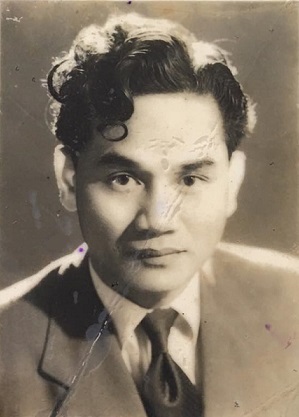
Ngô Xuân Diệu was a Vietnamese poet, journalist, short-story writer, and literary critic, best known as one of the prominent figures of the twentieth-century Thơ mới Movement. Heralded by critics as "the newest of the New Poets", Xuân Diệu rose to popularity with the collection Thơ thơ (1938), which demonstrates a distinct voice influenced by Western literature, notably French symbolism. He was one of the first to employ Western poetic devices like enjambment in Vietnamese poetry, while occasionally adhering to traditional forms like lục bát. Between 1936 and 1944, his poetry was characterized by a desperation for love, juxtaposed with a desire to live and to experience the beauty of the world. After joining the Vietnamese Communist Party in 1945, the themes of his works shifted towards the Party and their resistance against the French and the Americans. When he died in 1985, he left behind about 450 poems, as well as several short stories, essays, and literary criticisms.
The Communist Party of Indochina is one of three predecessors of the Communist Party of Vietnam. Other two predecessors are the Communist Party of Annam and the Communist League of Indochina.

The Personalist Labor Revolutionary Party, often simply called the Cần Lao Party, was a Vietnamese political party, formed in the early 1950s by the President of South Vietnam Ngô Đình Diệm and his brother and adviser Ngô Đình Nhu. Based on mass-organizations and secret networks as effective instruments, the party played a considerable role in creating a political groundwork for Diệm's power and helped him to control all political activities in South Vietnam. The doctrine of the party was ostensibly based on Ngô Đình Nhu's Person Dignity Theory and Emmanuel Mounier's Personalism.
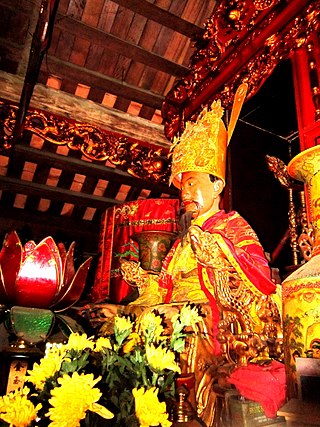
Ngô Quyền, often referred to as Tiền Ngô Vương, was a warlord who later became the founding king of the Ngô dynasty of Vietnam. He reigned from 939 to 944. In 938, he defeated the Southern Han dynasty at the Battle of Bạch Đằng River north of modern Haiphong. The battle is usually remembered in Vietnamese national history as it ended 1,000 years of Chinese rule over Vietnam dating back to 111 BC under the Western Han dynasty. A central district in modern Haiphong is named after him.

The Vietnam Reform Revolutionary Party or the Việt Tân is an organisation that aims to establish liberal democracy and reform Vietnam through peaceful and political means.
Đặng Nhật Minh is one of Vietnam's foremost film directors. He began making documentary films around 1965 and is the first Vietnamese person to be awarded the Nikkei Asia Prize for Culture, in 1999. His films have won several prizes at international film festivals.

Cầu Giấy is an urban district of Hanoi, the capital city of Vietnam. The district currently has eight wards, covering a total area of 12.32 km2 (4.76 sq mi). It is bordered by Ba Đình district, Đống Đa district, Nam Từ Liêm district, Thanh Xuân district, Tây Hồ district, Bắc Từ Liêm district. As of 2019, there were 292,536 people residing in the district, the population density is 24,000 inhabitants per square kilometer.
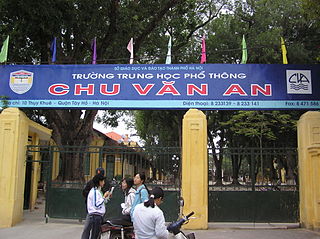
Chu Van An High School, also known as Chu Van An National School or Pomelo School one of the three national high schools for the gifted in Vietnam along with Quoc Hoc High School in Huế and Le Hong Phong High School in Ho Chi Minh City. It is also one of the three magnet high schools in Hanoi, Vietnam, along with Hanoi-Amsterdam High School and Nguyen Hue High School. Established by the French authorities in 1908 as High School of the Protectorate, Chu Van An is one of the oldest institutions for secondary education in South East Asia. Despite the initial intention to train native civil servants to serve the French colonial establishments, Vietnamese students at Bưởi school had many times struggled against colonial doctrine. A lot of Bưởi alumni became renowned political leaders and cultural figures in many areas of Vietnamese society such as Nguyễn Văn Cừ - the fourth general secretary of Communist Party of Vietnam, Phạm Văn Đồng - the first prime minister of North Vietnam and united Vietnam, Nguyễn Cao Kỳ- former vice president and prime minister of South Vietnam, Kaysone Phomvihane- former leader of the Lao People's Revolutionary Party, Prince Souphanouvong- the first president of Laos.
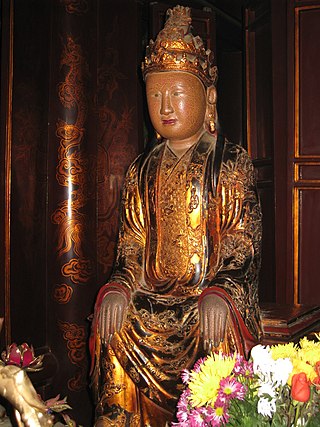
Dương Thị Ngọc Vân (楊氏玉雲, ?–1000) courtesy name Vân Nga (雲娥) was the only empress dowager of the Đinh dynasty and afterwards empress of Lê Đại Hành, the first emperor of the Early Lê dynasty. When her husband Đinh Tiên Hoàng was assassinated in 979, Dương Vân Nga became the Empress Dowager of the Đinh dynasty as her son Đinh Phế Đế succeeded the throne. During the short-lived reign of Đinh Phế Đế, Dương Vân Nga and the general Lê Hoàn jointly held the regentship for the 6-year-old emperor, later it was Dương Vân Nga and general Phạm Cự Lượng who decided to cede the Đinh dynasty's throne for Lê Hoàn in 980 so that Đại Cồ Việt could stand the Song dynasty's invasion with a capable ruler. Subsequently, Lê Hoàn entitled Dương Vân Nga as his empress, hence she became the first woman in the history of Vietnam to be married to two emperors.

National Economics University (NEU) is a public research university in Hanoi, Vietnam. Founded in 1956, its history and influence have made it one of the leading universities in Economics, Public Administration and Business Administration in Vietnam.
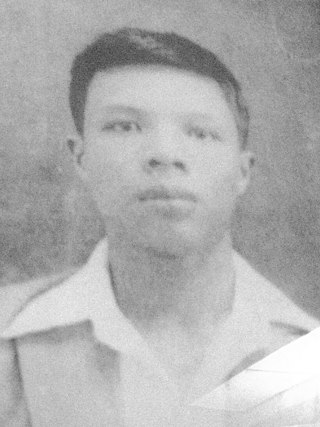
Trần Văn Cung was a Vietnamese revolutionary, who was the secretary of the first communist cell in Vietnam.
The Hồ Chí Minh Prize is an honorary award given by the government of Vietnam in recognition of cultural and/or scientific achievement. The prize was established by decree in 1981, and has been awarded in 1996, 2000, 2005 and 2012, often posthumously. The prize is named for Ho Chi Minh, who was Chairman and founder of the Workers' Party of Vietnam, that is considered one of the highest honors bestowed by Vietnam.
The following is a list of political organizations and armed forces in Vietnam, since 1912:
The 11th Central Committee of the Communist Party of Vietnam was elected at the 11th National Congress of the Communist Party of Vietnam. The 11th Central Committee elected the 11th Politburo and the 11th Secretariat.
The High School for Gifted Students, Hanoi University of Science, Vietnam National University is a specialized, most-selective public magnet school of Hanoi University of Science. The school serves as a national educational institution to nurture talented Vietnamese students who excelled at natural sciences. The largest percentage of its graduates attend the most prestigious universities in Vietnam.
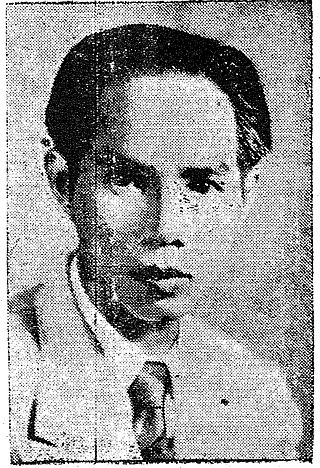
Phan Văn Hùm was a Vietnamese journalist, philosopher and revolutionary in French colonial Cochinchina who, from 1930, participated in the Trotskyist left opposition to the Communist Party of Nguyen Ai Quoc.
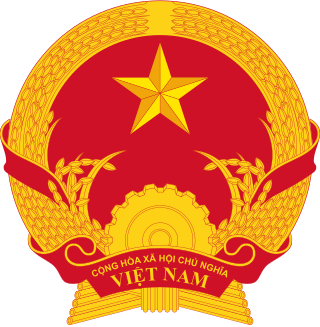
The 13th Central Committee of the Communist Party of Vietnam (CPV) has been in session since the conclusion of the 13th National Congress in 2021. It elected, at its 1st Plenary Session, the Politburo and the Secretariat of the 13th term.
The 7th Central Committee of the Communist Party of Vietnam (CPV) was elected at the 7th CPV National Congress. It elected the 7th Politburo and the 7th Secretariat.











